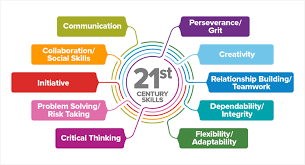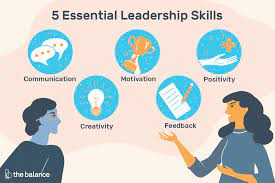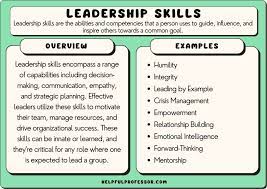Leadership is a crucial skill that can make or break an organization. Effective leaders inspire their team, set goals, and guide their team towards success. However, leadership is not just about being in charge; it’s about inspiring and motivating others to achieve their full potential.
One of the most important aspects of leadership is communication. Leaders must be able to clearly articulate their vision and goals to their team, as well as listen actively to feedback and concerns. Effective communication creates a sense of trust and respect between the leader and their team, which is essential for achieving success.
Another important leadership skill is the ability to delegate tasks effectively. Leaders must be able to identify the strengths and weaknesses of each team member and assign tasks accordingly. Delegating tasks not only ensures that each task is completed efficiently but also allows team members to develop new skills and gain experience.
Leaders must also be adaptable and able to handle change effectively. In today’s fast-paced business world, change is inevitable, and leaders must be able to navigate these changes while keeping their team motivated and focused on achieving their goals.
A good leader also recognizes the importance of collaboration. Encouraging teamwork fosters creativity, innovation, and better problem-solving skills. Leaders who value collaboration create a positive work environment where everyone feels valued and supported.
Finally, effective leaders lead by example. They set high standards for themselves as well as their team members, demonstrating integrity, accountability, and a strong work ethic. By leading by example, leaders inspire their team members to do the same.
In conclusion, leadership skills are essential for success in any organization or industry. Effective communication, delegation skills, adaptability, collaboration, and leading by example are all key components of good leadership. By developing these skills through training or practice over time, anyone can become an effective leader who inspires others towards success.
Answers to Commonly Asked Questions About Developing Leadership Skills
- What are the key qualities of a successful leader?
- How can I develop my leadership skills?
- What strategies can I use to motivate my team?
- How do I build trust and credibility with my team?
- How do I handle difficult conversations with employees?
- How can I become a better listener and communicator as a leader?
What are the key qualities of a successful leader?
There are many qualities that contribute to a successful leader. Here are some of the key qualities that are often cited:
- Visionary: A successful leader has a clear vision for the future and can inspire others to work towards that vision.
- Communication skills: Effective communication is essential for any leader. They must be able to articulate their vision, goals, and expectations clearly and listen actively to feedback and concerns.
- Integrity: Leaders must be honest, ethical, and trustworthy. They should lead by example and hold themselves accountable for their actions.
- Empathy: Successful leaders understand their team members’ needs and concerns and can empathize with them. They create a positive work environment where everyone feels valued and supported.
- Decisiveness: Leaders must be able to make tough decisions quickly when necessary. They should have the courage to take calculated risks when needed.
- Adaptability: Change is inevitable in any organization, and leaders must be able to adapt quickly to new situations while keeping their team motivated and focused on achieving their goals.
- Strategic thinking: Successful leaders have a strategic mindset, which allows them to see the big picture and make decisions that align with long-term goals.
- Emotional intelligence: Leaders with high emotional intelligence can manage their own emotions as well as those of others effectively. They can build strong relationships with team members based on trust, respect, and empathy.
- Creativity: Creativity is essential for innovation, problem-solving, and staying ahead of the competition. Successful leaders encourage creativity in their team members by fostering a culture of innovation.
In conclusion, successful leaders possess a combination of qualities that allow them to inspire others towards success while maintaining integrity, empathy, adaptability, strategic thinking, emotional intelligence, creativity, decisiveness, and effective communication skills.
How can I develop my leadership skills?
Developing leadership skills requires a combination of self-reflection, education, and practice. Here are some steps you can take to develop your leadership skills:
- Identify your strengths and weaknesses: Take some time to reflect on your strengths and weaknesses as a leader. Think about what you do well and where you could improve.
- Learn from others: Seek out mentors or role models who demonstrate effective leadership skills. Observe their behavior, ask questions, and learn from their experiences.
- Attend training or workshops: Look for training programs or workshops that focus on developing leadership skills. These programs can provide valuable insights into effective leadership practices and help you develop new skills.
- Practice communication skills: Communication is a critical component of effective leadership. Practice active listening, clear articulation of your ideas, and giving constructive feedback.
- Delegate tasks effectively: As a leader, it’s important to delegate tasks effectively to your team members based on their strengths and weaknesses.
- Encourage teamwork: Encourage collaboration among team members by creating opportunities for them to work together on projects or tasks.
- Lead by example: Set high standards for yourself as well as your team members by demonstrating integrity, accountability, and a strong work ethic.
- Seek feedback: Ask for feedback from team members or colleagues on how you can improve your leadership skills.
Remember that developing strong leadership skills takes time and effort. By focusing on self-improvement, seeking out opportunities for education and practice, and leading by example, you can become an effective leader who inspires others towards success.
What strategies can I use to motivate my team?
Motivating a team can be a challenging task, but there are several strategies that you can use to inspire your team members and keep them engaged. Here are some effective strategies for motivating your team:
- Set clear goals: Clear and specific goals help team members understand what they are working towards and provide a sense of direction. Make sure that the goals are achievable and relevant to the team’s work.
- Provide regular feedback: Regular feedback helps team members understand how they are performing and where they need to improve. Positive feedback also helps boost morale and motivation.
- Encourage collaboration: Encouraging teamwork fosters creativity, innovation, and better problem-solving skills. This creates a positive work environment where everyone feels valued and supported.
- Recognize achievements: Celebrate the achievements of individual team members as well as the entire team. This recognition can be in the form of verbal praise, awards, or bonuses.
- Offer development opportunities: Providing opportunities for training, learning new skills or taking on new responsibilities can help motivate team members by giving them a sense of growth and progress.
- Lead by example: As a leader, you should set an example by demonstrating integrity, accountability, and a strong work ethic. By leading by example, you inspire your team members to do the same.
- Create a positive work environment: A positive work environment is essential for motivation. Encourage open communication, respect diversity, provide support when needed, and create opportunities for social interaction.
By implementing these strategies consistently over time, you can create a motivated and engaged team that is committed to achieving its goals while feeling valued and supported in their work environment.
How do I build trust and credibility with my team?
Building trust and credibility with your team is essential for effective leadership. When your team trusts and respects you, they are more likely to be motivated, productive, and committed to achieving the goals of the organization. Here are some ways you can build trust and credibility with your team:
- Be transparent: Share information about the organization’s goals, challenges, successes, and failures with your team. This shows that you trust them and value their input.
- Communicate effectively: Listen actively to your team members’ concerns and feedback. Respond honestly and openly to their questions or criticisms.
- Lead by example: Set a positive example for your team by demonstrating integrity, accountability, and a strong work ethic.
- Be consistent: Consistency in your words and actions builds trust over time. Your team will know what to expect from you, which helps create a sense of stability.
- Show empathy: Recognize that each team member has their own unique challenges and needs. Show empathy towards them by being supportive, understanding, and flexible when possible.
- Give credit where it’s due: Acknowledge your team members’ contributions publicly and give credit where it’s due. This shows that you value their hard work and dedication.
- Invest in their development: Provide opportunities for professional growth through training or mentorship programs. This demonstrates that you are invested in their success.
Building trust and credibility takes time, but it’s worth the effort in the long run. By following these tips consistently over time, you can create a positive work environment where everyone feels valued, respected, and committed to achieving the organization’s goals together.
How do I handle difficult conversations with employees?
Handling difficult conversations with employees is a challenging but necessary part of being a manager or leader. These conversations can be uncomfortable and emotional, but they are essential for addressing issues and improving performance. Here are some tips on how to handle difficult conversations with employees:
- Prepare for the conversation: Before you have the conversation, prepare yourself by reviewing the facts and any relevant policies or procedures. Think about what you want to say and how you want to say it. Consider the employee’s perspective and anticipate their reactions.
- Choose an appropriate time and place: Choose a private location where you won’t be interrupted or overheard. Schedule the conversation at a time when both you and the employee are calm and focused.
- Be clear and specific: Be clear about the issue or behavior that needs to be addressed, using specific examples if possible. Avoid making generalizations or assumptions about the employee’s behavior.
- Listen actively: Listen to the employee’s perspective without interrupting or becoming defensive. Show empathy and understanding, even if you don’t agree with their viewpoint.
- Focus on solutions: Instead of dwelling on past mistakes, focus on finding solutions that will help improve performance in the future. Work together with the employee to develop an action plan that addresses the issue.
- Follow up: After the conversation, follow up with the employee to ensure that they understand what was discussed and what is expected of them moving forward. Provide ongoing support and feedback as needed.
- Document everything: It’s important to document everything related to difficult conversations with employees, including what was discussed, any agreements made, and any follow-up actions required.
Remember that handling difficult conversations with employees is never easy, but it’s an important part of being a manager or leader. By preparing yourself, choosing an appropriate time and place, being clear and specific, listening actively, focusing on solutions, following up, and documenting everything, you can handle these conversations in a professional and effective manner.
How can I become a better listener and communicator as a leader?
Becoming a better listener and communicator is essential for any leader who wants to inspire and motivate their team towards success. Here are some tips to help you improve your listening and communication skills:
- Practice active listening: Active listening involves focusing on what the other person is saying, asking questions, and clarifying any misunderstandings. It shows that you value their input and helps build trust.
- Pay attention to body language: Nonverbal cues such as facial expressions, posture, and tone of voice can provide valuable information about how the other person is feeling. Paying attention to these cues can help you better understand their perspective.
- Be clear and concise: When communicating with your team, be clear about your expectations, goals, and feedback. Use simple language that everyone can understand.
- Practice empathy: Empathy involves putting yourself in the other person’s shoes and understanding their perspective. This can help you communicate more effectively by showing that you value their thoughts and feelings.
- Encourage open communication: Create an environment where everyone feels comfortable sharing ideas, concerns, and feedback. Encouraging open communication fosters trust and collaboration.
- Seek feedback: Ask for feedback from your team members about your communication style. This can help you identify areas where you need to improve.
- Practice active problem-solving: When faced with a challenge or conflict, practice active problem-solving by listening to all perspectives, brainstorming solutions together, and finding a mutually beneficial solution.
By practicing these skills regularly, you can become a more effective listener and communicator as a leader. Remember that it takes time and effort to develop these skills but the benefits are worth it – stronger relationships with your team members, increased productivity, improved morale, and ultimately greater success for your organization or business!




